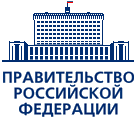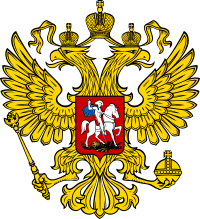Government of Russia
| Government of Russia | |
|---|---|
| Прави́тельство Росси́йской Федера́ции | |
 | |
| Overview | |
| Established | 1993 |
| State | Russian Federation |
| Leader | Prime Minister |
| Appointed by | President |
| Main organ | Council of Ministers |
| Responsible to | State Duma |
| Headquarters | Moscow |
| Website | government.ru |
The Government of Russia exercises executive power in the Russian Federation. The members of the government are the Prime Minister, the deputy prime ministers, and the federal ministers. It has its legal basis in the Constitution of the Russian Federation and the federal constitutional law "On the Government the Russian Federation".[1]
According to the 1991 amendment to the 1978 Russian Constitution, the President of Russia was the head of the executive branch and headed the Council of Ministers of Russia. According to the current 1993 Constitution of Russia, the President is not a part of the Government of Russia, which exercises executive power. But, the President does appoint the Prime Minister. The Chapter 6 of the Constitution of Russia says, that "The Government of the Russian Federation consists of the Chairman of the Government of the Russian Federation (Prime Minister), Deputy Chairman of the Government of the Russian Federation and federal ministries".
Overview
After the fall of the Soviet Union, the Russian Council of Ministers had become the main executive body. At some points it contained over 69 state committees, 16–17 ministers, 5 federal services, and over 46 governmental agencies. After the 2004 reform, government duties were split between 17 ministries, 5 federal services, and over 30 governmental agencies. The Russian Federation practices asymmetrical federalism. This means that not all regions are treated equally and that some regions have been given more autonomy than others. There are 7 super regions (federal districts) with a super governor that answers to the President. Those super regions include the South, Central, North-West, Far East, Siberia, Ural, Volga, and North Caucasus. They were established in May 2000.
The prime minister, currently Dmitry Medvedev, is appointed by the president (currently Vladimir Putin), and confirmed by the State Duma. He or she succeeds to the presidency if the current president dies, is incapacitated, or resigns.
Corruption is common and widespread in the government. According to 2016 results of Corruption Perception Index of Transparency International, Russia ranked 131st place out of 176 countries with score 29. Multiple anti biggest stances taken against corruption is the formation of the Anti-Corruption Council in 2008.
History
The large body was preceded by Government of the Soviet Union. Since the Russian Federation emerged in 1991 to 1992, the government's structure has undergone several major changes. In the initial years, a large amount of government bodies, primarily the different ministries, underwent massive reorganization as the old Soviet governing networks were adapted to the new state. Many reshuffles and renamings occurred.
On 28 November 1991, President of the RSFSR Boris Yeltsin signed presidential decree No.242 "On reorganization of the government bodies of the RSFSR". Yeltsin officially declared the end of the Soviet Union and became the President of the Russian Federation. Yeltsin was a reformer and promised Western-styled democracy.
In 1993 the new Russian Constitution was adopted. The new Constitution gained legitimacy through its bicameral legislature, independent judiciary, the position of the president and the prime minister, and democratic features. These democratic features included competitive multi-party elections, separation of powers, federalism, and protection of civil liberties.
In 1999, Yeltsin appointed Vladimir Putin as the Prime Minister. Later in that year, Yeltsin resigned from the presidency and Putin took over. In 2000 Putin won the presidential election.
The most recent change took place on 21 May 2012, when President Vladimir Putin signed a presidential decree on forming Dmitry Medvedev's Cabinet.[2][3]
Responsibilities and power
| This article is part of a series on the |
| Politics of the Russian Federation |
|---|
 |
The Government is the subject of the 6th chapter of the Constitution of the Russian Federation. According to the constitution, the government of the Russian Federation must:
- draft and submit the federal budget to the State Duma; ensure the implementation of the budget and report on its implementation to the State Duma;
- ensure the implementation of a uniform financial, credit and monetary policy in the Russian Federation ;
- ensure the implementation of a uniform state policy in the areas of culture, science, education, health protection, social security and ecology;
- manage federal property;
- adopt measures to ensure the country's defense, state security, and the implementation of the foreign policy of the Russian Federation;
- implement measures to ensure the rule of law, human rights and freedoms, the protection of property and public order, and crime control;
- exercise any other powers vested in it by the Constitution of the Russian Federation, federal laws and presidential decrees.[4]
The government issues its acts in the way of decisions (Постановления) and orders (Распоряжения). These must not contradict the constitution, federal constitutional laws, federal laws, and Presidential decrees, and are signed by the Prime Minister.
The Government, also assists the Prime Minister, in faithfully carrying out the country's domestic and foreign policy as determined by the President, in general.
Current Cabinet
The cabinet consists of the following members:[5]
See also
References
- ↑ Russian Government web portal – Text of 1997 Federal Constitutional Law "On the Government of the Russian Federation" (in Russian)
- ↑ "Премьер представит президенту структуру правительства 15 мая" [Prime Minister will present the government structure to the President on May 15]. Vesti. 11 May 2012. Retrieved 22 September 2017.
- ↑ "New Cabinet Has Familiar Cast of Characters". The Moscow Times. 21 May 2012. Retrieved 22 September 2017.
- ↑ The Constitution of the Russian Federation: Chapter 6 Archived October 18, 2008, at the Wayback Machine.
- ↑ Governmental Structure
External links
- Official website of the Government of Russia
- Organigram of the federal executive bodies at government website (in Russian)

